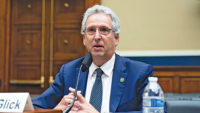Using the half-completed $2.7-billion construction of Terminal 1 at Newark Liberty International Airport in Newark, N.J., as backdrop, the chief of the New York City region's major transportation agency on May 20 amplified its week-earlier plea for $3 billion in federal aid to cover COVID-19-depleted revenue.
Rick Cotton, executive director of The Port Authority of New York and New Jersey, said the shortfall from big drops in air, rail, bus, port and bridge traffic and commerce puts at risk an estimated $20 billion for planned capital projects from its budget and leveraged private investment. The authority had asked Congress for funding in a May 13 appeal.
The bistate authority, which does not primarily rely on public funding, estimates a $3-billion projected revenue decline over two years. “Normally we’re a self-sustaining agency. The drop in travel volume has blown a $3-billion hole in our revenue,” he said.
The shortfall is not expected to affect the Newark terminal project’s funding and schedule, with completion set for 2022, although the normally bustling airport was noticeably less active for noon on a weekday.
Newark had reported about 75,000 usual departing travelers per day, but anticipates only about 3,000 departures daily over Memorial Day weekend, according to Cotton. He added that passenger traffic is down 97% at five airports it runs, including JFK and LaGuardia, both in New York City.
New Efficiencies
Cotton said the agency has taken steps to improve efficiency, such as closing 100 unused airport gates, as well as parts of airport terminals and the Port Authority Bus Terminal in Manhattan. Those steps are estimated to have saved $200 million.
But projects—including billions of announced upgrades at JFK Airport set to start this summer, a $2-billion air train at LaGuardia to link to existing rail lines, an extension of the PATH rail line to Newark airport, a $2-bilion replacement of that airport’s aging air train; and renovation of the PA bus terminal in Manhattan—could face extended delays or scope change.
“If we don’t get federal aid, we’re going to be looking at every project,” Cotton said. "We are looking at a forecast of what we can afford with dramatically reduced revenue.” He did not disclose whether the agency has developed a project-priority list.
The Port Authority did gain $450 million for airport losses under the federal CARES Act, but it does not receive transit rail grants and wants federal officials to add authorities as a fourth category to state, county and municipalities that could gain funds to cover costs or losses in the next stimulus bill, if and when it happens.
The agency's alternatives would be big fare and fee hikes, layoffs of thousands of employees, or more borrowing, with all three options having major consequences, said the Regional Plan Association, a planning advocacy group, in a new report.
But the Empire Center, a conservative-leaning government spending watchdog group, said agency payroll grew by $150 million last year, particularly due to police overtime compensation. An agency spokeswoman attributes the rise to added security needed at the LaGuardia Airport construction site.
Funding Prospects
Congress is considering two bills that could plug some authority budget holes, but other agencies across the country are competing for those funds as well.
The House approved last week a $3-trillion COVID-19 relief bill, the Health and Economic Recovery Omnibus Emergency Solutions (HEROES) Act, which would provide funds for state and local governments, more unemployment assistance, small business grants and hazard pay for essential workers. But the Senate is not acting quickly, with numerous opponents to another stimulus.
Also, a bipartisan bill—the State and Municipal Assistance for Recovery and Transition Act (SMART)—proposed on May 18 by Sen. Robert Menendez (D-NJ) and Sen. Susan Collins (R-Maine), would provide $500 million.
Cotton speculated that a "target" for action on the legislation would be mid-June but some observers envision a longer time frame.
“It is imperative that the Port Authority receive the financial assistance it needs to weather the ongoing public health crisis," said U.S. Rep. Albio Sires, (D-N.J.), one of 25 bi-state members of Congress who sent a May 20 letter to House leaders supporting the funding request, which notes the region as "the epicenter of the COVID-19 pandemic." He said the agency's work "helps keep the country's economic engine running."
“If our capital plan were not to go forward, we won’t be in a position to drive an economic recovery,” Cotton said. “We’re right at the absolute bottom. It’s the speed of the recovery that’s at stake."






Post a comment to this article
Report Abusive Comment